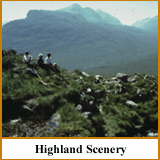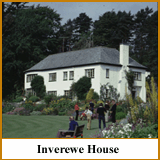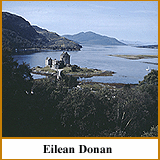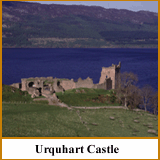

 |
 |
|
|
|
|
South
of Scotland
| West Highlands & Islands,
Loch Lomond, Stirling & Trossachs |
Perthshire, Angus & Dundee and Kingdom of Fife | The
Highlands of Scotland | Grampian
Highlands, Aberdeen & North East Coast | The
Outer Islands - Orkney, Shetland and Western Isles | Edinburgh
- City, Coast and Countryside | Greater
Glasgow & Clyde Valley |
|||
| THE
HIGHLANDS OF SCOTLAND |
||||
| This is one of the last wildernesses in Europe - through the soaring beauty of Glencoe to the idyllic charm of the Isles and from the crashing waves of the northern coastline to the eerie silence of windswept moors. | ||||
| THE EASTERN SEABOARD The Highland's eastern seaboard between Nairn and John o' Groats is well worth discovering. The Moray Firth town of Nairn is noted for its mild climate and low rainfall, as well as its superb beaches. At Cromarty on the Black Isle (really a green and wooded peninsula), the Courthouse of former days tells the fascinating story of this historic Scots burgh. The attractive little town of Tain was a place of pilgrimage in medieval times - a story told in the visitor centre Tain through Time, while the Glenmorangie Distillery and Visitor Centre is also close by. A little further on, Dornoch, famed for its golf course, is a picturesque old town with colourful gardens in the streets around its cathedral.
Thurso is Scotland's most northerly mainland town, a base for excursions into the typical countryside of Caithness, with open pastures and endless loch-studded moorland rolling down to a rugged coastline. On the way west, the north-facing coast has its own special qualities - cool, clear light, rugged headlands and dazzling white beaches. West of the Kyle of Durness is the lighthouse at Cape Wrath (access to the area is by ferry and minibus), while nearby lie the highest mainland sea cliffs in Britain. THE WESTERN SEABOARD On the western coast, the island of Handa has spectacular seabird colonies while back on the mainland, Eas Coul Aulin is the highest waterfall in Britain. These are just two of the natural attractions for lovers of wild places. Between the fishing port of Lochinver and the town of Ullapool lies a choice of routes. The coastal route offers sublime sea views across a pattern of rocky islands, while the faster main road reaches Ullapool via the dramatic mountainous landscapes of the Inverpolly National Nature Reserve.
Along the River Spey, from Grantown-on-Spey westwards, lies a good range of attractions. Landmark Visitor Centre at Carrbridge combines indoor Highland history presentations with outdoor enjoyment of the forests by way of trails and a nature centre. The Strathspey Railway offers a nostalgic return to the days of steam. Also near Boat of Garten is the Loch Garten Nature Reserve, where one can view the domestic life of nesting ospreys from a special observation hide. Nearby is the Speyside Heather Centre, taking the theme of this characteristic Highland plant and its past uses, which includes rope-making, thatching and even beer-making. Aviemore offers plenty of choice for shopping, eating and overnight stays. Close by, you can sample life on a Highland estate starting from the Rothiemurchus Visitor Centre or take a trip to see the reindeer, which thrive on the slopes of the Cairngorm Mountains. Further up the River Spey, Newtonmore is home to the Clan MacPherson Museum. Fort William at the southern end of the Great Glen has a wide range of shops, places to eat and accommodation. Down by the waterfront, is one of Scotland's many high quality seafood restaurants with its own fishing boat unloading its catch directly into the kitchen. The town's West Highland Museum has a number of items associated with Bonnie Prince Charlie, while Britain's highest mountain, Ben Nevis, standing at 4,406 feet, overlooks the town. Superb views of the surrounding hills can be enjoyed from the gondola system (operating all year) on the Nevis Range ski area, a few minutes drive northwest of the town on the slopes of Aonach Mor. Fort William is also a natural touring centre. The Corran Ferry to the south of the town is just one gateway to the peerless landscapes of Ardnamurchan. It is well worth exploring the peninsula all the way to the tip, the most westerly point on mainland Britain, for the dramatic landscapes and seascapes. These include some superb sandy beaches with panoramic views to the Isle of Skye. Another option is to join the scenic route, sometimes described as "The Road to the Isles" running from Fort William westwards to Mallaig via Glenfinnan, where a monument stands on the site where Bonnie Prince Charlie rallied the Highland clans for his ill-fated rebellion of 1745. The impressive viaduct at Glenfinnan carries the famous Fort William - Mallaig Railway, one of the great railway journeys of the world. SKYE AND THE SMALL ISLES The Isle of Skye has a bridge linking it to the mainland, giving a useful round-trip option using the ferry service from Mallaig to Armadale in the south of the island. Skye offers some of Scotland's most dramatic landforms, the best known of which are the Cuillin Hills. Beyond the main town of Portree, with its choice of accommodation, the dramatic geology continues with the rock formation known as the Old Man of Storr. The Quiraing, an extraordinary assembly of pinnacles, rock towers and secret places is yet another example of Skye's spectacular landscapes. The seat of the Clan Macleod at Dunvegan Castle is a favourite excursion, while the Skye Museum of Island Life recalls the past ways of the local people. The Clan Donald Centre at Armadale explores the theme of the powerful clan whose chiefs were the Lords of the Isles. Also important for its perspective of Skye, is the Aros Heritage Centre in Portree, telling the story of the island since 1700 from the point of view of the ordinary islanders. There are also island crafts, including souvenirs in Skye marble. Echoing the dramatic skyline of Skye on a smaller scale, Rum is the most spectacular of the Small Isles, which also include Eigg, Muck and Canna - a scattering of green islands, tiny communities reached by boat from Mallaig or Arisaig - the ultimate in getting-away-from-it-all excursions. |
||||
|
 A
portrait of time past is painted at the Timespan Heritage Centre
in Helmsdale, using sound effects, models and historic artifacts. With
fine seascapes and many opportunities to explore the dramatic coastline
along the way, the main road leads to Wick, where the Wick Heritage
Centre tells of the heyday of this fishing port. Many visitors
continue to John o' Groats, though the most northerly mainland point is
at Dunnet Head, to the west, while to the east, three spectacular stone
"needles" stand in the sea at Duncansby Head.
A
portrait of time past is painted at the Timespan Heritage Centre
in Helmsdale, using sound effects, models and historic artifacts. With
fine seascapes and many opportunities to explore the dramatic coastline
along the way, the main road leads to Wick, where the Wick Heritage
Centre tells of the heyday of this fishing port. Many visitors
continue to John o' Groats, though the most northerly mainland point is
at Dunnet Head, to the west, while to the east, three spectacular stone
"needles" stand in the sea at Duncansby Head.  Ullapool,
by the shores of Loch Broom, is a ferry port for the Western Isles and
a touring centre for the northwest, while the town itself has a good range
of services and various local museums. Continuing southwards, the main
road passes close to Corrieshalloch Gorge, a deep wooded
ravine. Inverewe Garden at Poolewe is in the care of the
National Trust for Scotland. Here, a once barren headland has been transformed
with exotic plants and trees offering an almost continuous display of
colour throughout the year, because of the frost-free, gentle climate,
warmed by the Gulf Stream.
Ullapool,
by the shores of Loch Broom, is a ferry port for the Western Isles and
a touring centre for the northwest, while the town itself has a good range
of services and various local museums. Continuing southwards, the main
road passes close to Corrieshalloch Gorge, a deep wooded
ravine. Inverewe Garden at Poolewe is in the care of the
National Trust for Scotland. Here, a once barren headland has been transformed
with exotic plants and trees offering an almost continuous display of
colour throughout the year, because of the frost-free, gentle climate,
warmed by the Gulf Stream. Nearby
Gairloch offers a range of accommodation and places to eat as well as
a Heritage Museum. The road then leads on to the beauties
of Loch Maree, where fragments of ancient natural pinewoods survive in
the Beinn Eighe National Nature Reserve. The mountainous
scenery around Glen Torridon is spectacular, partly in the care of the
National Trust for Scotland, who also look after Kintail, to the south.
Nearby on the shores of Loch Duich, you will find the picturesque Eilean
Donan Castle.
Nearby
Gairloch offers a range of accommodation and places to eat as well as
a Heritage Museum. The road then leads on to the beauties
of Loch Maree, where fragments of ancient natural pinewoods survive in
the Beinn Eighe National Nature Reserve. The mountainous
scenery around Glen Torridon is spectacular, partly in the care of the
National Trust for Scotland, who also look after Kintail, to the south.
Nearby on the shores of Loch Duich, you will find the picturesque Eilean
Donan Castle. To
the west, the Great Glen is a coast-to-coast valley formed in ancient
geological times. Today it holds the main Inverness - Fort William road
as well as the string of lochs connected to form the Caledonian Canal.
Visitors taking the main road to the north of Loch Ness can visit two
exhibitions in Drumnadrochit exploring the theme of the Loch Ness
Monster. Alternatively, the road down the south side of Loch Ness
offers fine forest walks near Inverfarigaig, a spectacular waterfall at
Foyers, plus outstanding views over Loch Ness itself. Both routes converge
at Fort Augustus.
To
the west, the Great Glen is a coast-to-coast valley formed in ancient
geological times. Today it holds the main Inverness - Fort William road
as well as the string of lochs connected to form the Caledonian Canal.
Visitors taking the main road to the north of Loch Ness can visit two
exhibitions in Drumnadrochit exploring the theme of the Loch Ness
Monster. Alternatively, the road down the south side of Loch Ness
offers fine forest walks near Inverfarigaig, a spectacular waterfall at
Foyers, plus outstanding views over Loch Ness itself. Both routes converge
at Fort Augustus.